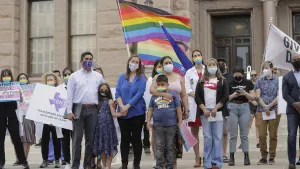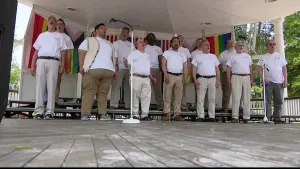2 Long Island beach communities serve as safe havens for LGBTQ community
Archivists say the Pines and Cherry Grove on Fire Island have acted as a safe haven for the LGBTQ community since the 1930s.
•
Jun 22, 2021, 2:28 AM
•
Updated 1,440 days ago
Share:
More Stories
1:31

What's Cooking: Uncle Giuseppe's Marketplace's prime rib roast
157ds ago1:27

What's Cooking: Uncle Giuseppe's quiche lorraine
389ds ago2:34

Guide: Safety tips to help prevent home burglaries
453ds ago2:19

Guide: Safety measures to help prevent fires and how to escape one
601ds ago2:07

Tips on how to avoid confrontation with sharks while swimming in the ocean
685ds ago2:33

5 tips to prevent mosquito bites and getting sick from viruses
696ds ago1:31

What's Cooking: Uncle Giuseppe's Marketplace's prime rib roast
157ds ago1:27

What's Cooking: Uncle Giuseppe's quiche lorraine
389ds ago2:34

Guide: Safety tips to help prevent home burglaries
453ds ago2:19

Guide: Safety measures to help prevent fires and how to escape one
601ds ago2:07

Tips on how to avoid confrontation with sharks while swimming in the ocean
685ds ago2:33

5 tips to prevent mosquito bites and getting sick from viruses
696ds agoFor nearly a century, two Long Island beach communities have served as safe havens for the LGBTQ community.
Archivists say the Pines and Cherry Grove on Fire Island are known for their beautiful beaches and vibrant night life. They have also acted as a safe haven for the LGBTQ community since the 1930s.
Cherry Grove resident Brian Clark, who is co-curator of the exhibition Safe Haven: Gay Life in 1950s Cherry Grove, says during the 1930s there were a lot of theater people out there like Truman Capote and Tennessee Williams.
"It tells a story that may be different from the story that people were told at that time a shameful story -- sometimes a hateful story," says Clark.
Clark says Cherry Grove provided a welcoming sanctuary to a community of men and women who were largely shunned during that time. In Cherry Grove, they could be free and out.
"Was such a dangerous thing to do to be identified at that time as a homosexual," says Clark. "It would mean you could possibly lose your job, lose your family."
The outdoor exhibition in Manhattan includes 70 photos and stories of many residents and visitors from that time.
"You see people having so much joy and so much fun," says Clark.
PJ McAteer is Managing Director of The Pines, located one beach to the east. He's been coming to the area for 30 years.
With breathtaking views from the bay to the ocean, residents say it's not just a community it's like family.
"1966 was one of the original tea dances here at the Pines," says McAteer.
The dance was held at The Blue Whale. It was a time when men dancing with men and women dancing with women was illegal and many venues were not licensed nightclubs.
"In the gay community all throughout the world they've imitated the tea dance," says McAteer.
McAteer keeps a protective eye over the more than one dozen properties he controls.
More from News 12
0:45

Parade and performances highlight 'Long Island Pride' celebration in Huntington Village
1:57

Long Island Pride celebration begins Sunday in Huntington
1:34

Village of Babylon's Pride Parade draws hundreds for Pride Month celebrations

Guide: LGBTQ resources and support groups
2:49

Guide: How to support local LGBTQ-owned and -friendly businesses
1:57
